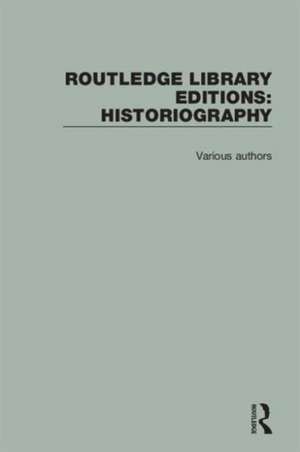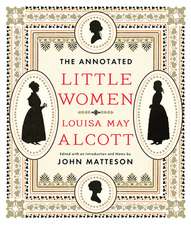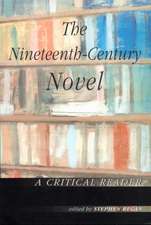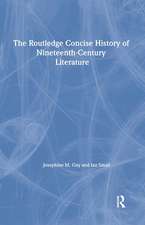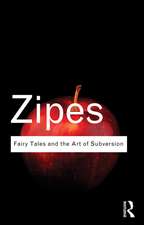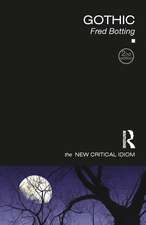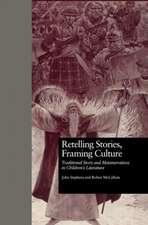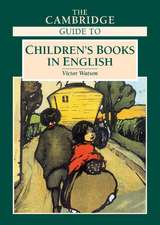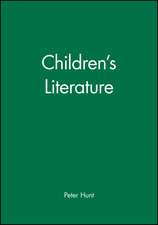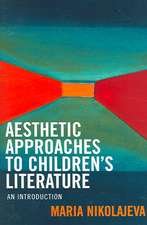Routledge Library Editions: Historiography: Routledge Library Editions: Historiography
Autor Variousen Limba Engleză Hardback – 5 apr 2016
The development of historical understanding during the 18th and 19th centuries was one of the most striking features of Western culture. Both historiography and historical thinking advanced as never before. The historial movment of the 19th century was perhaps second only to the scientific revolution of the seventeenth century in transforming Western thought. One consequence was extensive organisation and professionalization of research, which the volumes in this set reflect.
Din seria Routledge Library Editions: Historiography
- 16%
 Preț: 241.15 lei
Preț: 241.15 lei - 16%
 Preț: 241.15 lei
Preț: 241.15 lei - 34%
 Preț: 765.84 lei
Preț: 765.84 lei - 34%
 Preț: 826.01 lei
Preț: 826.01 lei - 16%
 Preț: 241.15 lei
Preț: 241.15 lei - 12%
 Preț: 312.43 lei
Preț: 312.43 lei - 14%
 Preț: 323.55 lei
Preț: 323.55 lei - 34%
 Preț: 624.60 lei
Preț: 624.60 lei - 38%
 Preț: 766.65 lei
Preț: 766.65 lei - 34%
 Preț: 622.59 lei
Preț: 622.59 lei - 17%
 Preț: 148.43 lei
Preț: 148.43 lei - 38%
 Preț: 764.62 lei
Preț: 764.62 lei - 34%
 Preț: 765.01 lei
Preț: 765.01 lei -
 Preț: 348.25 lei
Preț: 348.25 lei - 54%
 Preț: 514.03 lei
Preț: 514.03 lei - 12%
 Preț: 299.52 lei
Preț: 299.52 lei - 34%
 Preț: 765.01 lei
Preț: 765.01 lei - 16%
 Preț: 241.15 lei
Preț: 241.15 lei - 34%
 Preț: 766.24 lei
Preț: 766.24 lei - 34%
 Preț: 765.01 lei
Preț: 765.01 lei - 17%
 Preț: 238.85 lei
Preț: 238.85 lei - 34%
 Preț: 823.57 lei
Preț: 823.57 lei - 36%
 Preț: 823.57 lei
Preț: 823.57 lei - 34%
 Preț: 624.60 lei
Preț: 624.60 lei - 34%
 Preț: 496.94 lei
Preț: 496.94 lei - 17%
 Preț: 166.59 lei
Preț: 166.59 lei -
 Preț: 389.38 lei
Preț: 389.38 lei - 33%
 Preț: 557.51 lei
Preț: 557.51 lei - 16%
 Preț: 241.15 lei
Preț: 241.15 lei - 34%
 Preț: 763.78 lei
Preț: 763.78 lei -
 Preț: 346.82 lei
Preț: 346.82 lei - 34%
 Preț: 765.01 lei
Preț: 765.01 lei - 34%
 Preț: 765.01 lei
Preț: 765.01 lei - 34%
 Preț: 823.17 lei
Preț: 823.17 lei - 34%
 Preț: 766.65 lei
Preț: 766.65 lei
Preț: 10868.31 lei
Preț vechi: 17390.23 lei
-38% Nou
Puncte Express: 16302
Preț estimativ în valută:
2079.68€ • 2176.82$ • 1730.93£
2079.68€ • 2176.82$ • 1730.93£
Carte tipărită la comandă
Livrare economică 31 martie-14 aprilie
Preluare comenzi: 021 569.72.76
Specificații
ISBN-13: 9781138999589
ISBN-10: 113899958X
Pagini: 8494
Dimensiuni: 156 x 234 mm
Greutate: 0.45 kg
Ediția:1
Editura: Taylor & Francis
Colecția Routledge
Seria Routledge Library Editions: Historiography
Locul publicării:Oxford, United Kingdom
ISBN-10: 113899958X
Pagini: 8494
Dimensiuni: 156 x 234 mm
Greutate: 0.45 kg
Ediția:1
Editura: Taylor & Francis
Colecția Routledge
Seria Routledge Library Editions: Historiography
Locul publicării:Oxford, United Kingdom
Public țintă
General, Postgraduate, and UndergraduateCuprins
1. Foundations of Modern Historical Thought : From Machiavelli to Vico Paul Avis 2. History on the ground Maurice Beresford 3. The Historian's contribution to Anglo-American mis-understanding R. A Billington 4. The Art of History J. B. Black 5. History and Community Florence S. Boos 6. Between Memory and History Marie-Noelle Bourguet; Lucette Valensi, Nathan Wachtel. 7. Historians and the Open Society A. R. Bridbury 8. Studies in the Nature and Teaching of History W. H. Burston and Donald Thompson 9. The Origins of History Herbert Butterfield with an introduction by Adam Watson 10. The Historian at Work John Cannon 11. History and Historical Research C. G. Crump 12. Historicism and Knowledge Robert D'Amico 13. Perspectives on History William Dray 14. The Diversity of History J. H. Elliott and H. G. Koenigsberger 15. Approaches to History H. P. R. Finberg 16. History and Totality John E. Grumley 17. Annalists and Historians Denys Hay 18. A Theory of History Agnes Heller 19. The Critical Historian G. S. R. Kitson Clark 20. Aspects of History and Class Consciousness István Mészáros 21. The Gateway to History Allan Nevins 22. On the Writing of History C.W. Oman 23. The Grand Design of God C. A. Patrides 24. The Use of History A. L. Rowse 25. The Historian and the Climate of Opinion Robert Allen Skotheim 26. History As A Science Hugh Taylor 27. History and Ethnicity Elizabeth Tonkin, Maryon McDonald, Malcolm Chapman 28. The Learning of History D. G. Watts 29. Interpretations of History Alban G. Widgery 30. The Meanings in History Alban G. Widgery 31. History John Higham, Leonard Krieger and Felix Gilbert 32. History and Liberty A. Robert Caponigri 33. Alexandru D. Xenopol and the Development of Romanian Historiography Paul A. Hiemstra 34. History, its Purpose and Method G. J. Renier 35. Gyula Szekfü : a study in the political basis of Hungarian Historiography Irene Raab Epstein
Descriere
The greatest problem in historical scholarship, theoretically and practically, is the relation between the historian and his subject matter. The past is gone and the historian can only study its remnants. On what basis does the scholar select certain facts from the mass of data left from the past? How does he explain
Notă biografică
Various authors.
Original Series Editors:
David Canter is Emeritus Professor at The University of Liverpool, UK. Having set up the first MSc in Environmental Psychology at The University of Surrey in 1972, he went on to establish the Journal of Environmental Psychology in 1980, editing it for 20 years. Soon after he founded the International Association of People-Environment Studies (IAPS). David has published widely on many aspects of human interactions with their surroundings; his 1977 book The Psychology of Place, being one of the most cited publications in the area.
David Stea is Professor Emeritus of Geography and International Studies at Texas State University and Research Associate with the Center for Global Justice in Mexico. As Carnegie Interdisciplinary Fellow at Brown University from 1964 to 1966, he developed the new field of Environmental Psychology and the related study of spatial and geographic cognition. David is a member of the editorial boards of a number of journals, the co-author or co-editor of several books and author of some 150 articles and book chapters on various subjects, including sustainable development and environmental issues in Latin America. In 1987 he was nominated for the Right Livelihood Prize (also known as the “alternative Nobel”) for his international work with indigenous peoples.
Original Series Editors:
David Canter is Emeritus Professor at The University of Liverpool, UK. Having set up the first MSc in Environmental Psychology at The University of Surrey in 1972, he went on to establish the Journal of Environmental Psychology in 1980, editing it for 20 years. Soon after he founded the International Association of People-Environment Studies (IAPS). David has published widely on many aspects of human interactions with their surroundings; his 1977 book The Psychology of Place, being one of the most cited publications in the area.
David Stea is Professor Emeritus of Geography and International Studies at Texas State University and Research Associate with the Center for Global Justice in Mexico. As Carnegie Interdisciplinary Fellow at Brown University from 1964 to 1966, he developed the new field of Environmental Psychology and the related study of spatial and geographic cognition. David is a member of the editorial boards of a number of journals, the co-author or co-editor of several books and author of some 150 articles and book chapters on various subjects, including sustainable development and environmental issues in Latin America. In 1987 he was nominated for the Right Livelihood Prize (also known as the “alternative Nobel”) for his international work with indigenous peoples.
Recenzii
“The timely re-issue of the prescient Ethnoscapes series provides an invaluable contribution to current concerns about built and natural environments. The breadth of coverage of these books, includes public participation in environmental modifications, the impact of housing design on the quality of life, cross-cultural comparisons of placemaking, and the role of building aesthetics on well-being, across many countries and contexts adds up to a treasure trove of innovative research. Now more than ever we need the benefit of the insights and findings of these scholars and professional (many of course who are both) who, over three decades, have studied crucial aspects of interactions between people and their surroundings.”
Ricardo García Mira, Professor of Social Psychology, University of A Coruna, Galicia, Spain. Former Spanish MP.
“The reissued volumes in the Ethnoscapes series were ground- breaking when they first appeared and remain fresh today. These books are essential for understanding how design and the use of space has cultural and human meaning that “artificial intelligence” could never achieve. They offer a vital and timely antidote to mind-numbing apology for the appropriation of civic space and corporate reproduction of McMansions and shopping malls.”
Ben Wisner, Honorary Visiting Professor, University College London, UK.
“The physical aspects of our wonderfully complex world combine with social and psychological factors, to give a myriad of joys and sorrows accompanying our lifeworld activities. To make existence manageable, we need to find order within such chaos. As researchers of all types, but especially social scientists, we are driven to identify networks of causes and effects. This series provides excellent examples of such writing, concerning natural and built environments, from a host of scholars, representing a range of disciplines.”
Andrew Turk, Adjunct Associate Professor, Murdoch University, Western Australia.
“People interested and concerned about how we are interacting with and shaping our built and natural environments will find the insights and findings in this re-issued Ethnoscapes series of great value. Over more than 30 years this accumulated cornucopia of research reveals how important it is to understand the meanings and significance of many aspects of human- environment transactions. These include studies of user involvement in design, with its implications for place-making, as well as crucial explorations of the meaning of home and the role of environmental aesthetics for our wellbeing. Every volume opens new doors, often being the forerunners to major areas of study.”
Arza Churchman, Professor Emerita at Technion- Israel Institute of Technology, Haifa, Israel.
“The re-issue of the Ethnoscapes series provides everyone who cares about human-environment studies a wonderful opportunity to re-acquaint themselves with many groundbreaking efforts in the field. The series provides a wide range of explorations by researchers who have helped to make sense of persons in interaction with their surroundings, and contributed to inspired placemaking”.
Robert Gifford, Professor of Psychology and Environmental Studies, University of Victoria, British Columbia, Canada.
Ricardo García Mira, Professor of Social Psychology, University of A Coruna, Galicia, Spain. Former Spanish MP.
“The reissued volumes in the Ethnoscapes series were ground- breaking when they first appeared and remain fresh today. These books are essential for understanding how design and the use of space has cultural and human meaning that “artificial intelligence” could never achieve. They offer a vital and timely antidote to mind-numbing apology for the appropriation of civic space and corporate reproduction of McMansions and shopping malls.”
Ben Wisner, Honorary Visiting Professor, University College London, UK.
“The physical aspects of our wonderfully complex world combine with social and psychological factors, to give a myriad of joys and sorrows accompanying our lifeworld activities. To make existence manageable, we need to find order within such chaos. As researchers of all types, but especially social scientists, we are driven to identify networks of causes and effects. This series provides excellent examples of such writing, concerning natural and built environments, from a host of scholars, representing a range of disciplines.”
Andrew Turk, Adjunct Associate Professor, Murdoch University, Western Australia.
“People interested and concerned about how we are interacting with and shaping our built and natural environments will find the insights and findings in this re-issued Ethnoscapes series of great value. Over more than 30 years this accumulated cornucopia of research reveals how important it is to understand the meanings and significance of many aspects of human- environment transactions. These include studies of user involvement in design, with its implications for place-making, as well as crucial explorations of the meaning of home and the role of environmental aesthetics for our wellbeing. Every volume opens new doors, often being the forerunners to major areas of study.”
Arza Churchman, Professor Emerita at Technion- Israel Institute of Technology, Haifa, Israel.
“The re-issue of the Ethnoscapes series provides everyone who cares about human-environment studies a wonderful opportunity to re-acquaint themselves with many groundbreaking efforts in the field. The series provides a wide range of explorations by researchers who have helped to make sense of persons in interaction with their surroundings, and contributed to inspired placemaking”.
Robert Gifford, Professor of Psychology and Environmental Studies, University of Victoria, British Columbia, Canada.
